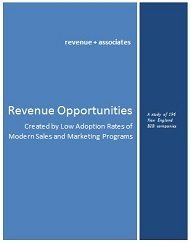Laurie: Hi, this is Laurie McCabe from the SMB Group. Today I’m talking to Louis Gudema, president of revenue + associates, which helps companies generate more revenue through measureable sales and marketing improvements. So Louis, I’ve known you for a while and I’ve know that revenue + associates is a new company for you, what’s prompted you to start it?
 Louis: I had a company before for a dozen years, a digital agency that I sold in 2009 that became one of the national leaders in our niche. Then I did business development for two other agencies for several years. What I saw was a need that wasn’t being addressed head on, which is corporate revenue generation.
Louis: I had a company before for a dozen years, a digital agency that I sold in 2009 that became one of the national leaders in our niche. Then I did business development for two other agencies for several years. What I saw was a need that wasn’t being addressed head on, which is corporate revenue generation.
A lot of agencies and people splinter it and say we’re going to help you with your website, we’re going to help with search, or we’re going help with advertising or with sales training, or whatever it may be, social media, but they’re not looking at the whole picture. Those point solutions may not be what a company really needs, and there may be other places where the best revenue opportunities lie for them.
Laurie: Yes, I think that’s a problem all of us can relate to. We know there’s many solutions out there but we have to frame up the problem and make sure we’re getting the right solution in place for it. How do you go about solving for that because it’s pretty complex?
Louis: I look across what I call a sales and marketing audit. There’s currently over a thousand companies, for example, providing sales and marketing software and dozens of channels from things like social and search advertising to traditional things like print.
So in a sales and marketing audit, I look across a company’s whole sales and marketing process, it’s a 100 plus point audit that looks at what technologies are they using, what is the strategy, internal operations, governance, budgets, how are they onboarding people and training people, do they have the staff, are there skills gaps? From that I identify the best short, mid, and long-term opportunities for the company and start working with them to drill down.
Laurie: Who are your services mainly designed for? Small, medium or larger companies, what’s the right size company for this approach?
Louis: It’s a company that really wants to grow revenue. I’ve seen surveys that three out of four small business owners don’t want to get any bigger. So I want to talk to the fourth one. I’m especially focused on mid-market companies with say 10 to 100 or 200 million in revenue. I’ve worked with companies like IBM and Philips Healthcare and Avid Technology and other very, very large companies and done millions of dollars of business with them but in terms of starting this new company and the particular approach, I’m especially focused on that mid-market.
Laurie: I know you recently published a report called Revenue Opportunities, what is that about and what did you find in there?
 Louis: What I did was I took a look at 196 mid-market companies in New England that were operating on a national level. Looking from the outside what could I see about how much they were adapting modern sales and marketing programs. This looks at things like did they have analytics on their website, were they doing search advertising, were they doing search engine optimization, did they have a mobile ready site?
Louis: What I did was I took a look at 196 mid-market companies in New England that were operating on a national level. Looking from the outside what could I see about how much they were adapting modern sales and marketing programs. This looks at things like did they have analytics on their website, were they doing search advertising, were they doing search engine optimization, did they have a mobile ready site?
Nine different things that could be seen from the outside, and it wasn’t only because those nine things can be very valuable and generate a lot of revenue when used well. I felt they were also an indicator of the maturity and depth of a company’s revenue generation program.
What I found was that of these 200 companies that operate nationally, so they all should be really eager to do as much as they can to generate revenue because they’re in competitive national or global markets. In fact, the average among those companies was that they were using less than three of those nine important programs and the median was two. It was a very, very low adoption rate.
Laurie: Why do you think the adoption rate for these things that are so directly tied to revenue so low?
Louis: I think it’s a couple things. The real outlier at the top end were SaaS and venture-backed companies. These are new companies, they’re very data driven and they’re very comfortable with technology, and they’re part of a world, especially that venture-backed world that knows this whole modern and very effective way to really ramp up revenue quickly.
I also get into other industries, like manufacturing or medical devices or engineering or architecture. I looked across a lot of industries. Then adoption rates plummet a lot so I think you have a situation where a company that’s doing okay, and has traditional ways of generating business. They know how those work for them and there’s this massive number of new things flying at them and they don’t know what’s real, what’s not real, what’s important. They don’t know where to start. They may have even tried one or two things but sometimes if you dip your toe in the water you can’t learn to swim, sometimes you have to really go in and embrace something to get the results. For a number of reasons the adoption of these technologies has been very slow, nationally even, from studies I’ve seen.
Laurie: These results you’re getting from these companies that are all in New England, do you think they represent the larger mid-market in the U.S.?
Louis: Actually, if anything, New England may be a little ahead of the national average because half of New England market is Massachusetts and Boston is a big part of that. There’s a lot of newer SaaS and venture-backed companies in Boston and Massachusetts. SiriusDecisions did a report that came out the same week as my report. They only looked at one of the nine factors, which was marketing automation and said just 16% of B2B companies nationally are using it. In my sample it was 28%. So it’s really low.
It’s not that I’m saying that these nine programs are the end all be all. As I said I’m really taking them at kind of a litmus test or thermometer to see how deep, how well built out are the revenue generation programs. There’s lots of other things like events and email newsletters and predictive analytics and lots of other things that companies can be using traditional and digital that may be the most effective for them, but these are the ones I could see.
Laurie: In the report it discusses the upside for the companies who do get more sophisticated in terms of how they generate revenue and what programs they put into place. If you aren’t doing some of this stuff right now where should you go to get started?
Louis: Well, there are several things. First, you need to adopt the mindset and recognize that this is an important area for revenue growth and something you need to invest in. You need to adopt a data-driven mindset and realize that your gut may not always be right and sometimes the data will take you someplace new.
You also need to be willing to experiment and even fail because these things will not work 100% of the time and they take implementation and analyzing and optimization to get it right. You have to invest in people and make sure they have the skills and that you’re adopting the right tools and that you know how to use them, and you have to find someone who can probably guide you through it. That thousand plus programs, those are in dozens of categories. Some of those categories are important to some companies and not others.
Once you’ve adopted a commitment to it and to budgeting and training and so on and so forth you’re going to have to take some time to figure out what are the right things for you and how to get them to all work together. That’s where the big payoff is, it’s not adopting one or two programs, but if you adopt a marketing automation program integrate it with your CRM and integrate it with your email marketing and other things so that everything starts working together.
Laurie: Louis, where can they go to learn more about the services that revenue + associates provides?
Louis: Our website is revenueassociates.biz. I also have a blog at Louisgudema.com.
Laurie: Can they get a copy of the report there?
Louis: Yes, you can get a copy of the report there, you can download it there. There’s actually a blog post at Louisgudema.com which is specifically about an SMB action plan, some of the things for a company that is new to these more modern programs, where are some of the places that you can start.
Laurie: Sounds great. Thanks again, Louis, for your time today, for joining me on SMB Spotlight. This really looks like something a lot of SMBs will want to look into because I think even if you don’t want to grow your business in terms of people, most businesses want to become more profitable and I think that all comes into play as well. So thank you again.
Louis:Thanks, Laurie.
